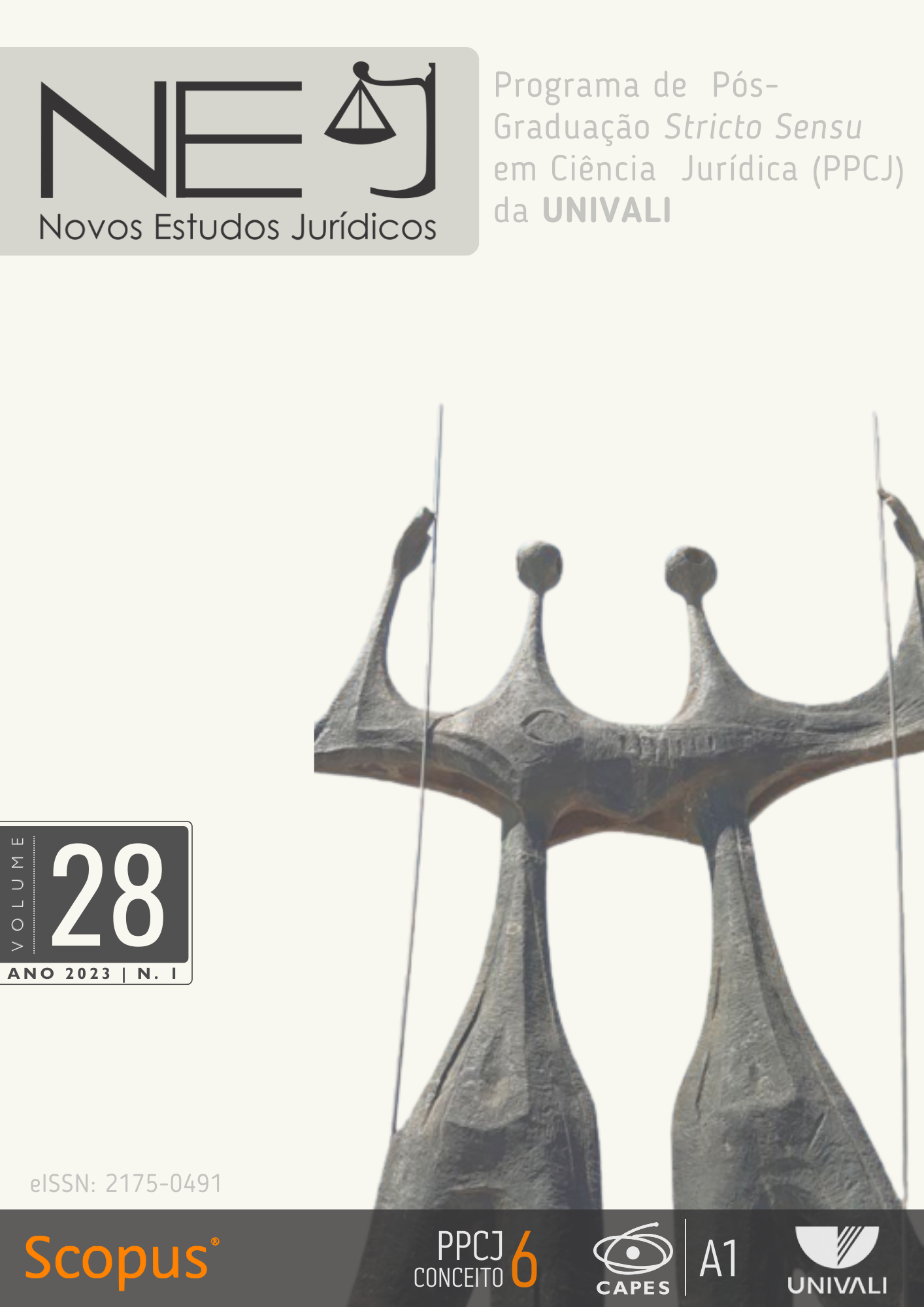FORMAL PRINCIPLES AND OVERRULING PRECEDENTS IN CONSTITUTIONAL COURTS
DOI:
https://doi.org/10.14210/nej.v28n1.p133-157Keywords:
Overruling constitutional precedents, Formal principles, Judicial discretion, Interpretative uncertaintyAbstract
Contextualization: The adjudication of fundamental rights is surrounded by tensions that put normative objectives of complex conciliation against each other. The dispute between the vocation of constitutional courts to correctly interpret fundamental rights in light of the constitution and the need of these same courts to control the predictability of the content of such rights is one of these tensions. This tension resonates in a number of debates in constitutional theory and legal theory. This paper will delve into a specific discussion that has been continuously informed and shaped by the conflicting relationship between the normative values of correctness and predictability in legal discourse: when should constitutional courts maintain or overcome their own precedents? The analysis will focus on the horizontal dimension of the authority of precedents in constitutional jurisdiction, that is, on the influence that a court's previous decisions exert on the institution itself.
Objective: To discuss how the challenge to the authority of constitutional precedents can be controlled argumentatively, that is, to define parameters and argumentative methodologies to evaluate the correctness of the overruling of precedents in constitutional courts.
Methodology: It was used the methodology provided by the theory of principles, applying the model to two decisions of the Brazilian Supreme Court.
Results: The article presented an argumentation model that aims to rationalize the overruling of precedents in situations where present courts are uncertain about what the constitution obligates, prohibits, or permits, and therefore, are unsure if past decisions correctly resolved a clash of fundamental rights. Using the methodology provided by the theory of principles, it is argued that the binding nature of precedents can be seen as a formal principle, which allows for a rational evaluation of the belonging of a given norm to the zone of judicial discretion based on a process of assigning weight to the authority of the precedent. Finally, the model is tested by applying it to two decisions of the Brazilian Supreme Court.
Downloads
References
ALEXY, Robert. Teoria dos Direitos Fundamentais. (tradução de Virgílio Afonso da Silva), São Paulo: Malheiros, 2017.
ALEXY, Robert. Formal principles: Some replies to critics. Icon, v. 12, p. 511–524, 2014. DOI: https://doi.org/10.1093/icon/mou051
ARGUELHES, Diego Werneck. PEREIRA, Thomaz. A decisão de Celso de Mello e o respeito a precedentes. Jota. 05.07.2016. Disponível em: https://www.jota.info/stf/supra/decisao-de-celso-de-mello-e-o-respeito-precedentes-stf-05072016.
BURTON, Steven J. The conflict between Stare decisis and overruling in constitutional adjudication. Cardozo Law Review, v.35, p.1687-1703, 2014.
BUSTAMANTE, Thomas da Rosa. Teoria do Precedente Judicial: a justificação e a aplicação de regras jurisprudenciais. São Paulo: Noeses, 2012.
DIMOULIS, Dimitri; MARTINS, Leonardo. Teoria Geral dos Direitos Fundamentais. 4 ed., São Paulo: Atlas, 2012.
DUXBURY, Neil. The Nature and Authority of precedent, Cambridge: Cambridge University Press, 2008. DOI: https://doi.org/10.1017/CBO9780511818684
KLATT, Mathias. Balancing competences: How institutional cosmopolitanism can manage jurisdictional conficts. Global Constitutionalism, v. 4, p. 195-226, 2015. DOI: https://doi.org/10.1017/S2045381715000039
KOZEL, Randy J. The Scope of Precedent. Michigan Law Review, v.. 113, p.179- p.230, 2014.
MACCORMICK, Neil, e SUMMERS, Robert. Introduction. In MACCORMICK, Neil, e SUMMERS, Robert (orgs.). Interpreting Precedents – A Comparative Study. Vermont: Aldershot- Asgate, 1997.
NEVES, Rafael. Pacote Anticrime de Moro ponto a ponto. Congresso em Foco. Congresso em Foco. 05.02.2019. Disponível em: https://congressoemfoco.uol.com.br/governo/pacote-anticrime-de-moro-ponto-a-ponto-veja-como-a-lei-e-hoje-e-o-que-pode-mudar. Acesso em: 17 de novembro de 2019
PERRY, Stephen R. Second-Order Reasons, Uncertainty and Legal Theory. South Carolina. Law Review, v.6, p. 913-994, 1989.
QUISPE, Jorge Alexander Portocarrero. El rol de los principios formales en la determinación del margen de control de constitucionalidade. Revista Derecho del Estado, v.27, p. 75-102, 2011.
SCHAUER, Frederick. Thinking like a Lawyer: A New Introduction to Legal Reasoning. Cambridge: Harvard University Press, 2009. DOI: https://doi.org/10.4159/9780674054561
SILVA, Virgílio Afonso da Silva. Direitos fundamentais e liberdade legislativa, in CORREA, Fernando Alves et al (orgs.), Estudos em homenagem ao Prof. Doutor José Joaquim Gomes Canotilho, v..3, Coimbra: Coimbra Editora, 2012: 915-937.
SILVA, Virgílio Afonso da. Comparing the Incommensurable: Constitutional Principles, Balancing and Rational Decision. Oxford Journal of Legal Studies, v. 31, p. 273 -301, 2011. DOI: https://doi.org/10.1093/ojls/gqr004
TARUFFO, Michele. Institutional Factors Influencing Precedents, in MACCORMICK, Neil, e SUMMERS, Robert (orgs.). Interpreting Precedents – A Comaparative Study. Aldershot, Asgate, 1997.
Downloads
Published
How to Cite
Issue
Section
License
Na qualidade de autor(es) da colaboração, original e inédita, sobre o qual me(nos) responsabilizo(amos) civil e penalmente pelo seu conteúdo, após ter lido as diretrizes para autores, concordado(amos) plenamente com as Políticas Editorias da Revista Novos Estudos Jurídicos - NEJ e autorizo(amos) a publicação na rede mundial de computadores (Internet), permitindo, também, que sua linguagem possa ser reformulada, caso seja necessário, sem que me(nos) seja devido qualquer pagamento a título de direitos autorais, podendo qualquer interessado acessá-lo e/ou reproduzi-lo mediante download, desde que a reprodução e/ou publicação obedeçam as normas da ABNT e tenham a finalidade exclusiva de uso por quem a consulta a título de divulgação da produção acadêmico científico.


















